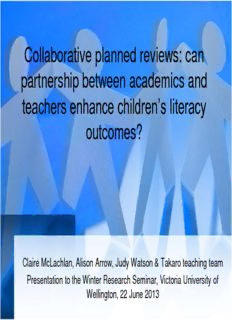
pdf4.8KBC McLachlan, A Arrow and J Watson PDF
Preview pdf4.8KBC McLachlan, A Arrow and J Watson
Collaborative planned reviews: can partnership between academics and teachers enhance children‟s literacy outcomes? Claire McLachlan, Alison Arrow, Judy Watson & Takaro teaching team Presentation to the Winter Research Seminar, Victoria University of Wellington, 22 June 2013 Overview of this session • This session will report the findings of a collaborative planned review of literacy in a state kindergarten in 2012 and will focus on the issue of partnership in professional learning. • The research team of Claire, Alison and Judy worked with the teaching team in two kindergartens over a period of three school terms to support children‟s literacy development. • Data was collected in a third kindergarten which was used as a control. • Case study data from one of the kindergartens (Takaro) will be presented today, along with data that compares children‟s progress with children from the control centre. In this kindergarten, a Massey CED facilitator was also involved in the planned review. • Implications for professional learning and policy will be explored. Introductions Our research partners: Wilai, Marion and Marie Takaro Kindergarten Links to philosophy • Takaro philosophy - Ako • Takaro Philosophy Explanation Philosophy - At Takaro Kindergarten we will Whanau provide a safe, fun learning environment for children and whanau to grow in their involvement confidence and competence. Takaro Kindergarten Logo was created by a committee and whanau in early 2000. It embraces the wairua of this learning community. The large tree in the middle depicts the adult‟s position in the nurturing of children, which are the two young trees on each side. The roots of the tree are the six strands of the philosophy that permeates the life and being of Takaro Kindergarten. Definitions of early literacy The term emergent literacy is used to: “denote the idea that the acquisition of literacy is conceptualised as a developmental continuum, with its origins early in the life of a child, rather than an all or none phenomenon that begins when children start school. This conceptualisation departs from other perspectives in reading acquisition in suggesting there is no clear demarcation between reading and pre-reading” (Whitehurst & Lonigan, 1998, p. 848). Literacy is a complex phenomenon, which could best be described as multifactorial. It involves individual, biological, social and cultural elements and, for this reason, we have based our explanations of how literacy develops on research which draws from neuroscience and psychology, as well as from sociology, education and anthropology (McLachlan, Nicholson, Fielding-Barnsley, Mercer & Ohi, 2013, p. 4). Components of literacy (Whitehurst & Lonigan, 1998) Outside - in processes Inside – out processes • Language – semantic, • Phonological awareness syntactic and conceptual • Syntactic awareness knowledge • Phoneme-grapheme • Narrative – correspondence understanding and producing narrative • Emergent writing • Conventions of print – knowledge of print format • Emergent reading – pretending to read Literacy as social practice • There are multiple literacies that children experience in their homes, communities and cultures, which shapes the ways in which they experience literacy (Makin, Jones Diaz & McLachlan, 2007). • Literacies are experienced both inside and outside formal settings (Knobel & Lankshear, 2003), within culturally specific ways. Why is literacy important in ECE? • Reading and writing skills serve as the major avenue for achieving the essential learning areas of the New Zealand Curriculum (Ministry of Education, 2007a) and are the foundation for learning in all subjects studied at school. • If children do not learn to read, their general knowledge, spelling, writing and vocabulary development suffer (Stanovich, 2000). • The National Early Literacy Panel Report (2009) identified some critical literacy understandings children need to develop to become literate at school, which include knowledge of the alphabet, phonological awareness (being aware of sounds in words), the ability to rapidly name letters, numbers, objects and colours, the ability to write their own name and to be able to remember spoken information for a short period of time. • In addition, children need to understand print conventions and concepts, have strong oral language and the ability to match and discriminate visual symbols (NELP, 2009). Our definition of literacy • Follows the simple view – we are focussing on decoding. • Includes Whitehurst and Lonigan‟s (1998) „inside- outside‟ definition of emergent literacy, the NELP (2009) findings, and a social practice view of literacy. • Skills encapsulated in terms of literate cultural capital: – Alphabet knowledge – Phonological awareness – Vocabulary skills Our framework Early childhood education Formal schooling R = Alphabet knowledge D Phonological awareness x Vocabulary knowledge C
Description: